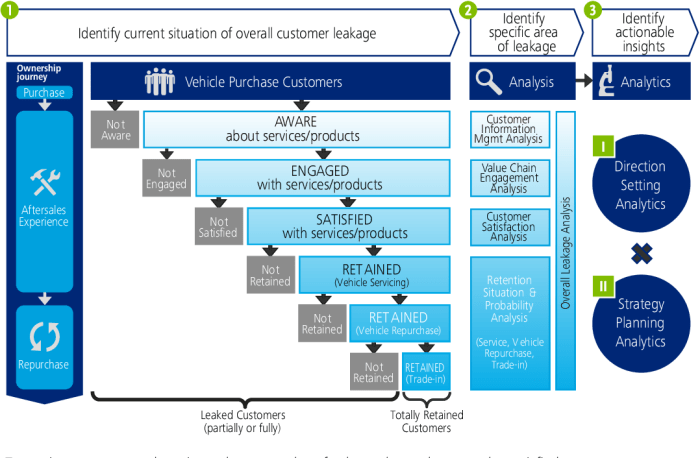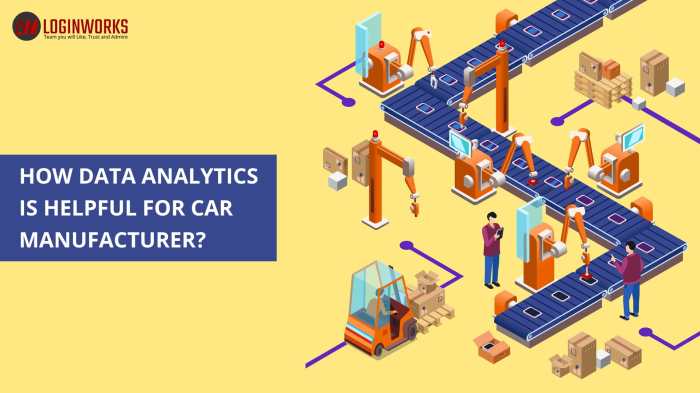How to Use Data Analytics in the Auto Industry sets the stage for a comprehensive exploration of leveraging data insights in the automotive sector, showcasing its transformative potential and practical applications.
The discussion delves into various facets of data analytics in the auto industry, highlighting its role in manufacturing, customer experience enhancement, and decision-making processes.
Introduction to Data Analytics in the Auto Industry

Data analytics in the context of the automotive sector involves the process of examining large sets of data to uncover valuable insights and patterns that can help automakers make informed decisions and improve their operations.
The significance of data analytics for automakers cannot be overstated. By utilizing data analytics, automakers can enhance their manufacturing processes, optimize supply chain management, improve vehicle performance and safety, personalize customer experiences, and even predict maintenance needs before issues arise.
Examples of How Data Analytics Can Revolutionize the Auto Industry
- Vehicle Performance Optimization: Through data analytics, automakers can analyze real-time data from sensors in vehicles to optimize performance, fuel efficiency, and overall driving experience.
- Predictive Maintenance: Data analytics can be used to predict maintenance needs of vehicles based on historical data and real-time monitoring, reducing downtime and improving customer satisfaction.
- Supply Chain Management: By analyzing data related to suppliers, inventory levels, and production processes, automakers can streamline their supply chain operations, reduce costs, and improve efficiency.
- Customer Insights: Data analytics can help automakers better understand customer preferences, behavior, and trends, allowing them to tailor products and services to meet the needs of their target market.
Applications of Data Analytics in Automotive Manufacturing
Data analytics plays a crucial role in optimizing various processes within the automotive manufacturing industry. By harnessing the power of data, manufacturers can enhance production efficiency, ensure quality control, and streamline supply chain management.
Optimizing Production Processes
Data analytics enables automotive manufacturers to analyze vast amounts of data generated during the production process. By leveraging this data, manufacturers can identify inefficiencies, optimize workflows, and minimize downtime. For example, predictive analytics can help anticipate maintenance needs for machinery, reducing the risk of unexpected breakdowns and improving overall production efficiency.
Predictive Analytics in Supply Chain Management
Predictive analytics also plays a significant role in ensuring efficient supply chain management in the automotive industry. By analyzing historical data and real-time information, manufacturers can forecast demand, optimize inventory levels, and improve procurement processes. This proactive approach helps manufacturers avoid stockouts, reduce lead times, and enhance overall supply chain performance.
Real-Time Data Analysis for Quality Control
Real-time data analysis is instrumental in enhancing quality control on the production line. By continuously monitoring production processes and analyzing data in real-time, manufacturers can detect defects or anomalies promptly. This proactive approach allows manufacturers to address quality issues immediately, minimize waste, and ensure that only high-quality products reach the market.
Enhancing Customer Experience with Data Analytics

Data analytics plays a crucial role in enhancing the customer experience in the auto industry. By leveraging customer data, automakers can personalize marketing strategies, improve after-sales services, and better understand customer preferences.
Personalized Marketing Strategies
- Automakers can analyze customer data to create targeted marketing campaigns based on individual preferences and behaviors.
- By segmenting customers into different categories, companies can tailor their messaging to specific demographics, increasing the likelihood of engagement.
- Personalized marketing can lead to higher conversion rates and customer loyalty, ultimately driving sales and revenue for the auto industry.
Improved After-Sales Services
- Data analytics can help automakers predict maintenance needs and proactively reach out to customers for servicing, enhancing the overall ownership experience.
- By analyzing data from connected vehicles, companies can offer remote diagnostics, schedule service appointments, and provide personalized recommendations for car owners.
- Efficient after-sales services not only improve customer satisfaction but also contribute to long-term customer retention and brand loyalty.
Understanding and Meeting Customer Preferences
- Through data analytics, automakers can gain valuable insights into customer preferences, such as preferred vehicle features, colors, and pricing options.
- By analyzing customer feedback and behavior, companies can tailor their product offerings to align with market demand, ensuring customer needs are met effectively.
- Understanding and meeting customer preferences not only leads to higher customer satisfaction but also helps automakers stay competitive in the rapidly evolving auto industry.
Data-Driven Decision Making in the Auto Industry
Data analytics plays a crucial role in enabling data-driven decision-making in the auto industry. By leveraging advanced analytics tools, automotive companies can gain valuable insights that help them anticipate market trends, forecast demand for vehicles, and make strategic decisions to stay competitive in the market.
Forecasting Market Trends and Demand for Vehicles
Data analytics allows automotive companies to analyze historical data, consumer behavior, economic indicators, and other relevant factors to forecast market trends and demand for vehicles. By using predictive analytics models, companies can identify patterns and trends that help them make informed decisions about production volumes, inventory management, and marketing strategies.
Strategic Decision-Making by Automotive Executives, How to Use Data Analytics in the Auto Industry
Automotive executives rely on data analytics to make strategic decisions that drive the growth and success of their companies. By analyzing data on sales performance, customer preferences, operational efficiency, and market dynamics, executives can identify opportunities for innovation, expansion, and cost optimization. Data-driven insights enable executives to allocate resources effectively, prioritize initiatives, and mitigate risks in a rapidly changing industry.
Driving Innovation and Competitiveness
Data-driven insights derived from analytics can fuel innovation and enhance competitiveness in the auto industry. For example, automakers can use data to develop new products and services tailored to customer needs, improve manufacturing processes for greater efficiency, and optimize supply chain operations for cost savings. By leveraging data analytics, companies can stay ahead of the competition, deliver superior products and services, and create value for customers in a dynamic market landscape.
Closing Notes: How To Use Data Analytics In The Auto Industry
In conclusion, the utilization of data analytics in the auto industry emerges as a game-changer, offering automakers valuable insights for innovation, customer satisfaction, and competitive advantage in a rapidly evolving market landscape.
When it comes to boosting sales in the automotive industry, Effective Marketing Techniques for Auto Dealers play a crucial role. From social media campaigns to targeted advertising, utilizing the right strategies can attract more customers and increase brand visibility.
For auto dealerships, having a clear understanding of auto financing options is essential. Offering flexible payment plans and competitive interest rates can help close deals and provide customers with the financial flexibility they need to make a purchase.